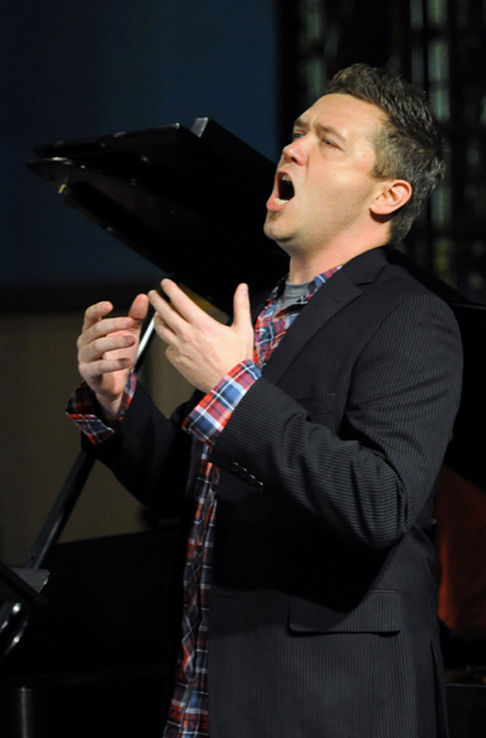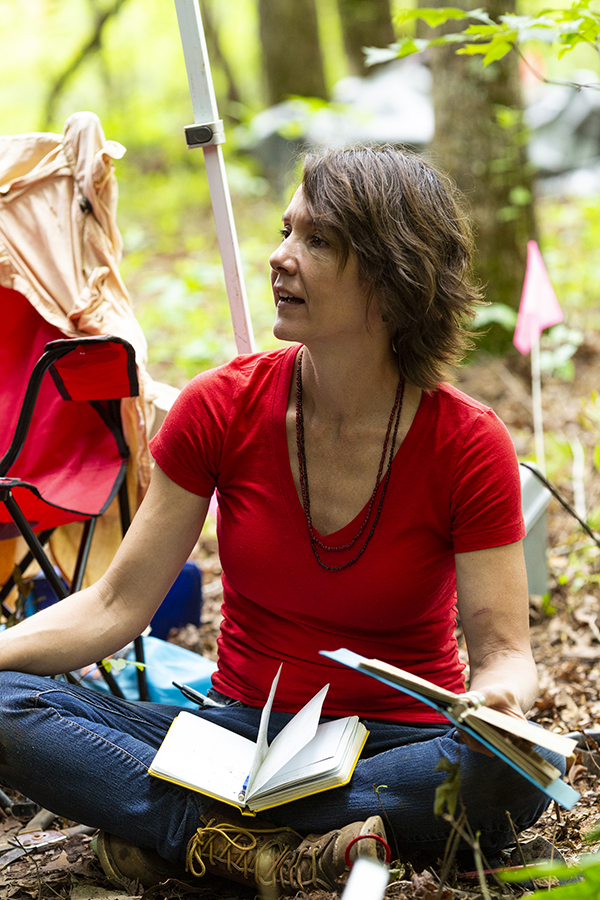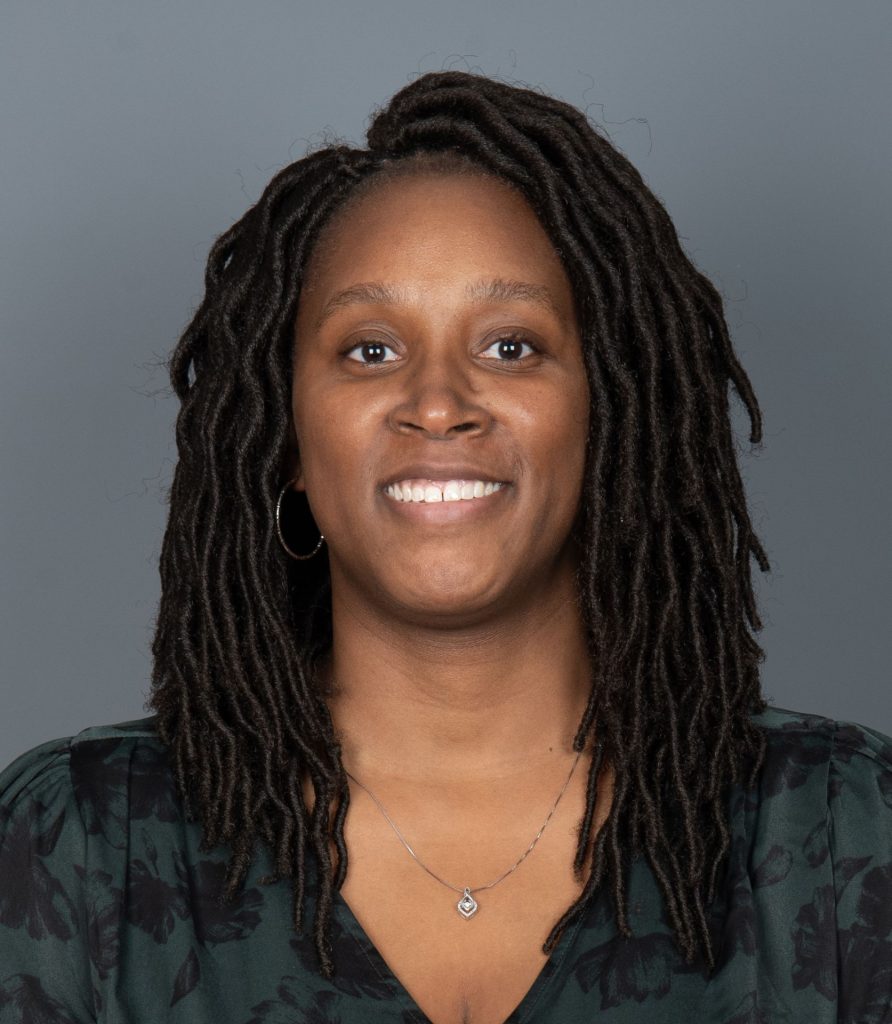Professor of Music Justin Vickers and Professor of Anthropology Kathryn Sampeck have been awarded Outstanding University Researcher Awards. Assistant Professor of Psychology Brea Banks, Assistant Professor of Human Development and Family Science Luke Russell, Assistant Professor of Physics Matt Caplan, Assistant Professor of Special Education Melinda Snodgrass, and Assistant Professor of Nursing Michele Shropshire have been awarded Research Initiative Awards.
Outstanding University Researcher Award
The Outstanding University Researcher Award recognizes faculty members for excellence in research. Candidates for this award must be nominated by their college dean and must be previous recipients of the Outstanding College Research Award.
Justin Vickers
Dr. Justin Vickers is a professor of music and artist teacher of voice. He is a British music researcher who specializes in the music, life, and endeavors of 20th-century composer Benjamin Britten and his spouse, the tenor Peter Pears. As a 2020-2021 U.S. Fulbright Scholar to the United Kingdom, Vickers focused on completing his first monograph “The Aldeburgh Festival of Music and the Arts: A History of the Britten and Pears Era, 1948–1986,” commissioned by The Boydell Press. A new project that will result in a co-edited volume with Joy H. Calico, Childhood and the Operatic Imaginary, has been awarded a 2022-2023 Exploratory Seminar funded by Harvard University’s Radcliffe Institute for Advanced Study to be delivered in the summer of 2022. Together with Philip Reed, Vickers is editing a memoir of the first Aldeburgh Festival manager, Elizabeth Sweeting, alongside her correspondence with Britten (The Bittern Press). He is co-editor of Benjamin Britten in Context for Cambridge University Press and Benjamin Britten Studies: Essays on An Inexplicit Art (The Boydell Press) with Vicki P. Stroeher. He has contributed to The Sea in the British Musical Imagination and Literary Britten: Words and Music in Benjamin Britten’s Vocal Works (both published by The Boydell Press) and has multiple Britten articles in print or at press. Vickers has been a regular contributor to programming at The Red House, Britten’s heritage home and archive in Aldeburgh on the Suffolk coast; he has performed there in recital and lecture-recitals, appeared on the “From The Red House” podcast, and in public talks, as well as writing essays for the annual exhibition booklets “Britten and Women,” “Such an artist to write for: Inspiration and Collaboration,” “Britten in America,” “Queer Talk: Homosexuality in Britten’s Britain,” and “Britten’s Words.” His additional research focuses on Britten’s song and the creative process, and the 33-year history of the English Opera Group, among other midcentury composers and subjects in the British Isles. Vickers has been named Visiting Fellow of Music at New College, University of Oxford, England, for Trinity Term 2023.
Kathryn Sampeck
Dr. Kathryn Sampeck is a professor of anthropology at Illinois State University and an associate with the DuBois Research Institute at the Hutchins Center for African and African American Research at Harvard University. Sampeck uses multidisciplinary approaches to investigate a variety of topics such as taste, cultural landscapes, race, literacy, money, and commerce in American commodities in the early modern world. She has devoted years of archaeological and historical research to understanding the cultural history of chocolate, and as a board member of the Fine Cacao and Chocolate Institute, advocates for a more equitable and transparent chocolate-cacao value chain. Her archaeological endeavors are community-based, including co-directed projects with the Tribal Historic Preservation Office of the Eastern Band of Cherokee Indians. She co-edited, with Stacey Schwartzkopf, the 2017 volume Substance and Seduction: Ingested Commodities in Early Modern Mesoamerica. She has published numerous articles in leading peer-reviewed history, anthropology, archaeology, and geography and Latin American Studies journals. Forthcoming works include “Rich: Cacao Money in Mesoamerica” and “Afro-Latin American Archaeology: An Introduction.” She currently holds a Fulbright scholarship to the United Kingdom for research at the British Library and has held two previous Fulbright scholarships. She was the Central America fellow at the David Rockefeller Center for Latin American Studies and the Afro-Latin American Research Institute at the Hutchins Center at Harvard University, a long-term and a digital fellow at the John Carter Brown Library at Brown University, and a fellow at Colonial Williamsburg. Major research grants have been funded by the National Science Foundation, Wenner-Gren Foundation for Anthropological Research, and the Social Science Research Council. She serves as the archaeology seat on the American Anthropological Association Executive Board, coordinates the Society for American Archaeology Afro-Latin American Archaeology Interest Group, and is editor of the journal Historical Archaeology.
Research Initiative Award
The Research Initiative Award recognizes new faculty members (within their first five years) who have initiated a promising research agenda early in their academic careers.
Brea Banks
Dr. Brea Banks rejoined the psychology department in 2017 after attending Illinois State University as an undergraduate student athlete and graduate student. Banks engages in research centered around equity. She has published work surrounding the microaggressive experiences of adolescents, the cognitive consequences of these race-based insults, their impact on perceptions of climate, and the effectiveness of trainings and workshops that aim to address microaggressions. Banks has a passion for working with students in her Researchers Addressing Microaggressions in Schools (RAMS) research lab. She has co-authored 10 manuscripts and provided 14 presentations at regional and national conferences with graduate students. She has successfully supervised two dissertations and three thesis projects, one of which was the 2021 Three Minute Thesis competition winner. She is currently chairing seven dissertation projects and is supervising several other graduate student projects. Banks serves as a section editor for the Journal of Underrepresented Minority Progress and is on the editorial board for the Journal of School Psychology. Since returning to ISU, she has authored 11 peer reviewed articles, four book chapters, one encyclopedia entry, has presented 14 posters and talks at conferences, and has given 40 invited talks on and off campus.
Matt Caplan
Dr. Matt Caplan joined Illinois State University in the fall of 2019. Caplan is a theoretical physicist, having earned his Ph.D. from Indiana University in 2017 and winning the Dissertation Award in nuclear physics from the American Physical Society. Prior to joining Illinois State, Caplan was a fellow at the McGill Space Institute. In 2021, he published papers on nuclear fission chain reactions, the ignition mechanism of supernova explosions, microscopic black holes as dark matter, and plasma crystallization in the cores of stars. Many of these received international press coverage, with articles appearing in NewScientist and Science magazine among others. Caplan is active in nuclear weapons policy and was an inaugural fellow of the Physicists Coalition for Nuclear Threat Reduction. Last year he met with four congressional offices to advocate for changes to U.S. nuclear weapons posture and was recognized by the American Physical Society with the Five Sigma Physicist award. In his spare time, he’s a writer for YouTube channels run by Kurzgesagt and PBS and has contributed to more than 50 videos with over 300 million combined views. In 2022, he is studying how stars freeze and whether there is a black hole in the center of the sun.
Luke Russell
Dr. Luke Russell is an assistant professor of human development and family science in the Department of Family and Consumer Sciences at Illinois State University. He has a Ph.D. in human environmental sciences with a concentration in human development and family science, and an M.S. in human development and family studies with a concentration in Family Science from the University of Missouri. At the University of Connecticut, he double majored in human development and family studies, and political science, and completed a minor in sociology. His research investigates how individuals living in diverse family structures (e.g., post-divorce families, remarried/stepfamilies, cohabiting families, single-parent families, etc.) organize their relationships, engage in strategies that promote resilience, and maintain family-members’ health and well-being. He also studies how broader social institutions (e.g., health care systems, schools, and government agencies) can function as supportive resources for those living in structurally diverse families. He currently serves on five editorial boards: Journal of Family Theory & Review, Journal of Family Nursing, Family Relations: Interdisciplinary Journal of Applied Family Science, Journal of Social and Personal Relationships, and Personal Relationships; and teaches courses in communication and helping skills, family policy, and enduring issues for couples and families.
Melinda Snodgrass
Dr. Melinda Snodgrass is an assistant professor at Illinois State University in the Department of Special Education. Snodgrass believes very deeply in the importance and moral imperative of desegregating our schools based on disability and has devoted her research agenda to pursuing inclusive education. Her current research focuses on building inclusive schools through family-school partnerships, systematic supports planning, and anti-ableist work, with a particular interest in supporting students who use augmentative and alternative communication. Because issues of research methodology are critical to the pursuit of more equitable, inclusive schools. Snodgrass has also devoted a significant portion of her research agenda to collaborative efforts arguing for the expansion of research methods that are valued by special education researchers and to re-examining how special education researchers attend to the impacts of their work on students, families, and educators.
Michele Shropshire
Dr. Michele Shropshire is a nurse researcher with Mennonite College of Nursing. Her research focuses on improving the quality of life, symptom management, and nursing care for older adults. Her research focus and advocacy for essential caregivers to older adults in long term care environments continues to be a priority. In addition, education for undergraduate students when caring for older adults living in long-term care environments remains a research passion and focus area for Shropshire.







